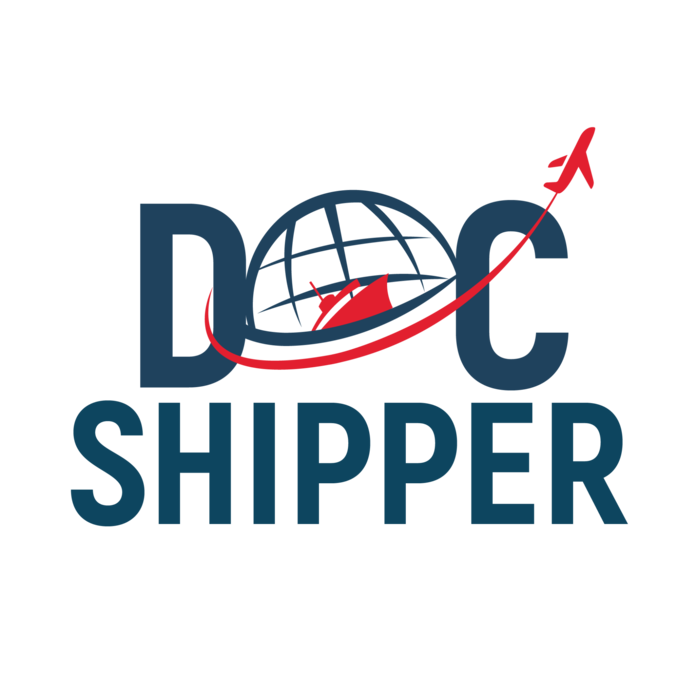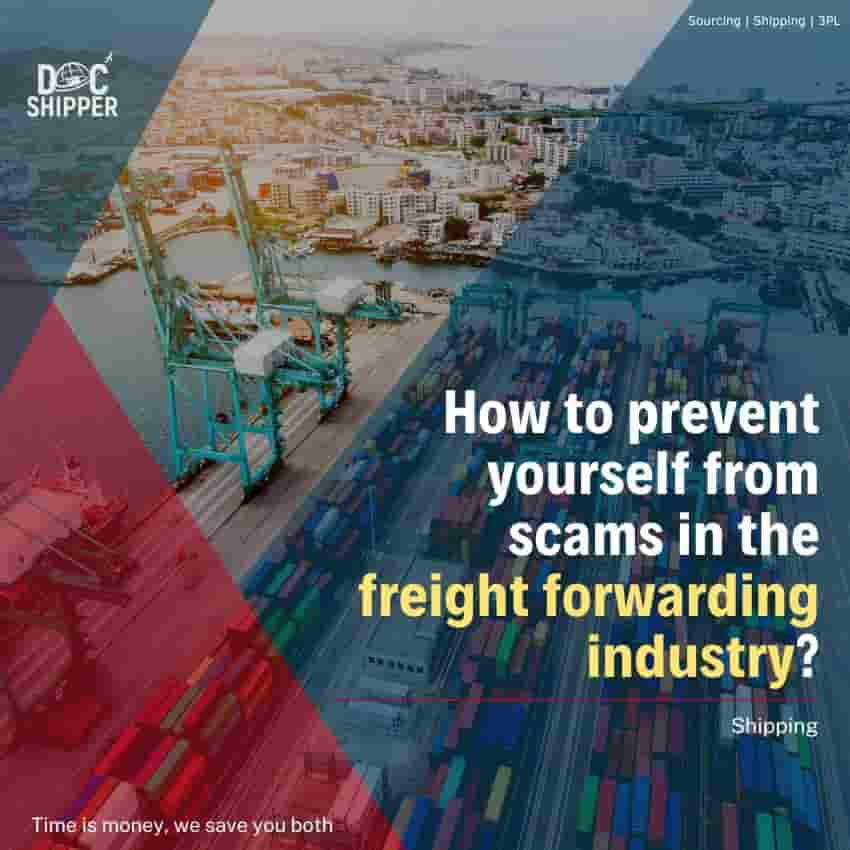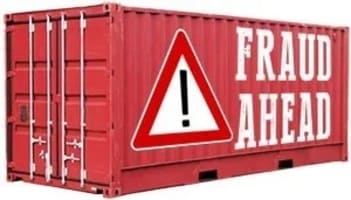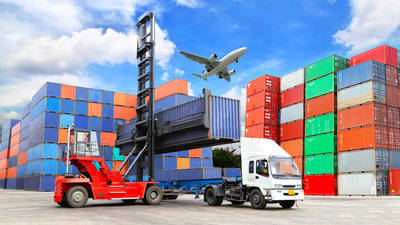Discover all our tips for dealing with and avoiding scams in the freight forwarding industry in our article!
Scams come in a wide variety of shapes and sizes, but they all have one thing: their perpetrators aim to con you into parting with money. Sadly, scams and frauds are common in the freight forwarding sector. This article will present you the issue of freight fraud and scams in this industry, their effects, and prevention measures.
Table of Contents
Freight forwarding frauds
Freight forwarding fraud is a specific kind of scam that involves the employment of dishonest or deceptive tactics by people or businesses that serve as middlemen between shippers and carriers.
The fraudster often offers to arrange the transportation of goods on behalf of a shipper while acting as a real freight forwarding business. They can demand payment in advance and guarantee to arrange for the delivery of the items using their network of carriers.
The fraudster may disappear after receiving payment or may give the shipper false information regarding the status of the delivery, leaving them without their goods or their money. In rare circumstances, the scammer may even supply phony tracking data to make it seem as though the products are in transit, when they are, in fact, being taken or detained.
Fraudulent freight forwarding can be extremely harmful to companies that depend on international shipping to transfer their products. It is crucial for shippers to thoroughly investigate any freight forwarding firms they interact with and to only choose reputable, authorized, and insured organizations. Furthermore, before agreeing to any agreements, shippers should always check the validity of the organization and the services they are offering and be wary of requests for upfront payment.
One sort of fraud that might cause victims to suffer considerable financial losses is the freight scam. The majority of scams use inaccurate or deceptive information to trick the victim into sending cash or items to the con artist.
Freight scams typically take place when a shipper or freight broker is paid to ship items, but the products are never actually delivered. The con artist may offer to carry the goods while assuming the identity of a reliable freight forwarding business. However, the con artist vanishes after receiving money, therefore the things are never delivered. This kind of fraud might take place with a single transaction or over the course of several transactions.
The fact that con artists may go to considerable pains to make their illegal conduct appear legitimate is one of the most worrying features of freight scams. They might imitate reputable businesses, utilize phony websites, or produce bogus paperwork. Victims may find it challenging to spot and stay away from fraudulent activities as a result of these strategies.
DocShipper info: By working with DocShipper, You won't have to worry about missing, damaged or never delivered products because we perform quality control before the transport of your products, feel free to contact us for help.
False freight forwarding businesses, double-brokering, and phantom pick-up are a few of the most typical sorts of freight scams. In phantom pick-up fraud, the products are scheduled for pickup but never arrive at their destination. In a double-brokering scheme, the fraudster obtains the shipment from the shipper, employs a different freight forwarder to carry the items, and then vanishes with the shipper's payment.
In fraudulent freight forwarding company scams, the con artist assumes the identity of a real freight forwarding company, offers to arrange the shipment of the goods, but after receiving payment, vanishes with it.
It's crucial for shippers to exercise due diligence and thoroughly examine any freight forwarding company they interact with in order to prevent becoming a victim of freight scams. They should look for references, confirm the credentials of the freight forwarder, and be aware of any demands for payment in advance. They should also be wary of any agreements that appear too good to be true and alert for warning signs like phony paperwork or odd payment terms. These actions can help shippers lower their chance of falling for freight scams and safeguard themselves against monetary losses.
Fake low costs permissions scams

After the target is won over by the reduced costs, the con artist might ask for a down payment to seal the sale. However, as soon as the money is transferred, the con artist vanishes and stops offering shipping services. Alternatively, the con artist can offer poor or nonexistent delivery services, which would cause the client to suffer sizable financial losses.
Scammers occasionally create bogus websites or social media identities to make their offerings seem trustworthy. The logos of well-known corporations may be used to build convincing-looking websites or social media pages, or they may use photoshopped representations of actual freight forwarding firms. The victim may find it challenging to distinguish between genuine and fraudulent offers as a result of these strategies.
Before committing to any deals, it's crucial to do your homework and study the freight forwarder to prevent falling for deceptive claims of reduced pricing. Shippers should investigate the credentials of the freight forwarder and confirm that they are duly registered and licensed as a business. In order to judge the reputation of the business, they should also read internet evaluations and comments left by prior clients.
DocShipper tips : You should be suspicious of any offers that look too good to be true. Deals that seem to be substantially cheaper than market rates are probably bogus offers. When paying freight forwarders, shippers should always use safe payment channels and be wary of requests for upfront payments, to counter this, DocShipper offers a sourcing service where shippers can protect themselves from fraudulent offers and unreliable freight forwarders. For more information about this service, you can contact us.
Deliberate delay scams
Fraudulent freight forwarders purposely delay the transportation of goods in order to demand additional fees or avoid paying carriers or other third parties. This practice is known as a deliberate delay scam. The freight forwarder may make a claim that there are problems with the delivery or customs clearance, or that additional fees or charges must be paid before the items can be released, in these kinds of scams.
Even after the consignee has paid for the shipment, the con artist may choose to hold up delivery of the items in order to collect more fees or charges. Both the shipper and the consignee may suffer large financial losses as a result, and there may be delays in the delivery of the products.
Deliberate delays are another trick used by dishonest freight forwarders to hold cargo hostage and demand more money. Until the shipper or consignee consents to pay additional fees or costs that were not revealed in the initial agreement, they may refuse to release the items.

Furthermore, it is critical to maintain constant communication with the freight forwarder and the consignee to ensure that the shipment is proceeding as planned. Any unforeseen delays or concerns should be handled as soon as possible, and any demands for additional fees or charges should be checked before payment is made.
Missing the Bill of Lading Delivery
Fraudulent freight forwarders may occasionally fail to deliver the Bill of Lading to the shipper or consignee, which can cause large financial losses and delays in the delivery of goods. The con artist may assert that the B/L is delayed, lost, or that customs or other officials are holding it. This may make it challenging for the shipper to demonstrate that the items were delivered, which may cause a holdup in payment or the release of the commodities at the destination.
The dishonest freight forwarder may occasionally refuse to release the B/L until the shipper or consignee pays extra fees or charges that weren't specified in the original contract. The delivery of the goods may be delayed as a result, and the shipper or consignee may incur unforeseen charges.
It is crucial for shippers to make sure they obtain the bill of Lading from the freight forwarder as soon as possible to prevent falling victim to this kind of fraudulent behavior. Additionally, they should confirm that the B/L is accurate and true to the conditions of the shipment agreement. The initial agreement did not include any requests for additional fees or charges, therefore shippers should be wary of any requests for these costs and should confirm their authenticity before agreeing to pay them. In order to lower the risk of fraud, shippers should also employ secure payment methods and perform due diligence on any freight forwarding businesses they work with.
Cargo Hijacking

Freight robbery can take place in a number of different methods, such as the taking of trucks or other vehicles, stealing from containers or parked cars, or stealing items from warehouses or shipping yards. To steal items, criminals may employ a range of strategies, including force, threats, and deceit.
Freight theft can cost shippers and carriers a lot of money, delay the delivery of goods, and cause other problems. Freight robbery occasionally causes damage to cargo or equipment, and it can endanger the safety of drivers and other people working in the transportation industry.
Shippers and carriers should improve the security of their cargo to reduce the danger of freight robbery. This may entail employing tracking systems to keep track of the whereabouts and movement of the products, choosing safe modes of transportation, and putting security measures in place including locking and sealing containers and vehicles.
In order to make sure that any third-party logistics service providers or freight forwarders involved in the shipment of products have the necessary security measures in place, it is also crucial to undertake due diligence on them. In high-risk zones, shippers and carriers should be aware of the possibility of freight robbery and adopt extra security measures.
Services Represented Inaccurately
When freight forwarders make exaggerated or fraudulent statements about the services they provide to their clients, this is referred to as misrepresenting their services. This could involve giving false information about how much their services will cost, the extent of their talents, or their experience and knowledge in a particular field.
For instance, a freight forwarder can misrepresent their possession of the appropriate authorizations and licenses to convey hazardous commodities. Alternatively, they can state that they will deliver goods by a given date, only to consistently miss those dates due to inadequate preparation or ineffective procedures. Think to check on directories of freight forwarders certified like the federal maritime commission, freight network corporation…
Freight forwarders who misrepresent their services to clients run the risk of causing delays, damage to products, and financial losses. Additionally, it could damage the credibility of the entire freight forwarding sector. Therefore, before entrusting them with their goods, clients should perform extensive due diligence on, and screen possible freight forwarders.
Fraudulent Forwarders
- Absence of appropriate coverage and licensing
In order to deceive their clients and profit, dishonest freight forwarders engage in unlawful or unethical practices. The practice of operating without the proper insurance and authorization is one that fraudulent forwarders frequently employ. This implies that they can lack the essential authorizations, licenses, or insurance coverage needed to move goods lawfully.
A dishonest forwarder may put their clients at serious risk if they operate without the necessary insurance and authorization. For instance, if the forwarder's activities result in a shipment being delayed, lost, or destroyed, the customer might not be able to sue or file an insurance claim to make up for their losses.
Clients that use dishonest forwarders run the danger of losing money, and if their shipments are proven to be in breach of transportation laws, they may also be subject to legal consequences. In some instances, this can lead to penalties, the retention of goods, and even criminal charges.
Clients should properly investigate prospective partners and ensure that they have the necessary licenses, permits, and insurance coverage in order to safeguard themselves from the hazards connected with fraudulent forwarders. They might also think about employing a trustworthy freight forwarding company or online directories that list legitimate freight forwarding businesses.
Falsely representing oneself as legitimate freight forwarders while having no intention of delivering the services they promise are known as fraudulent forwarders.
Fraudulent forwarders may find it simpler to flee with a client's goods or money if there is no specified location, as they may be able to avoid being discovered by law enforcement or regulatory bodies.
Prior to choosing a freight forwarding partner, it's crucial to do your research in order to avoid becoming a victim of dishonest forwarders. This may entail reviewing the business' registration and license details, checking testimonials, examining references, and confirming the business' actual address and existence in the sector, among other things.
- Unclear pricing
Unclear pricing can take many different forms, including obfuscated charges, surcharges, or extra expenses that are not explicitly included in the initial estimate or contract. For instance, a forwarder might offer a cheap transit rate but then tack on costs for packing, handling, or customs processing. Alternatively, they can omit to include additional costs for shipping to particular locations or for expedited delivery.
Uncertain pricing may be a deliberate strategy used by dishonest forwarders to trick customers and boost their revenues. However, it may also be the result of insufficient expense tracking and reporting tools or poor communication.
DocShipper Alert : To avoid falling victim, Clients should exercise caution to protect themselves from dishonest forwarders by checking the credentials and track record of prospective forwarders, carefully reading contracts and quotes, and requesting client references. Clients should also demand transparency and clarity on costs and fees, DocShipper, with its sourcing service, will accompany you through all the stages of the search and even the negotiation process, so that you do not fall victim to any fraud. Now you can contact us for more details.
- Contractual coercion
Before offering services, an honest freight forwarder won't push you to sign a contract. Walk away if you sense that you are being forced to sign something.
There are several ways to compel people to sign contracts, for as by providing them with attractive deals or discounts with time restrictions. The imposter forwarder might also employ high-pressure sales techniques or instill a sense of urgency, by asserting that there is a strong demand for their services or that space is limited.
- Inadequate disclosure
Inadequate disclosure can take many different forms, such as withholding or hiding information about how they operate or imposing unadvertised hidden fees.
These companies might run without the required authorizations or certifications, endangering the goods of their customers and possibly breaking national or international laws.
In order to trick customers into thinking they are doing business with a genuine company, scammers may build phony websites or social media accounts that mirror real freight forwarders. In order to give the impression of credibility, they could also use stolen or fraudulent credentials.
Clients should thoroughly investigate any possible forwarders and confirm their credentials, licenses, and certifications to prevent falling for scams by unlicensed or unregistered freight forwarders.
Absences of transparency
Clients should thoroughly investigate any possible forwarders and confirm their credentials, licenses, and certifications to prevent falling for scams by unlicensed or unregistered freight forwarders.
Lack of openness may show up as omitted or unclear initial quotes or contracts that contain hidden fees, surcharges, or other expenditures. For instance, a forwarder might offer a cheap transit rate but then tack on costs for packing, handling, or customs processing.
Billing issues
For instance, imposter forwarders could give hazy or insufficient details regarding their qualifications, expertise, or certificates. Additionally, they could omit to give crucial information regarding their offerings, such the price of transportation, customs clearance, or insurance.
Unofficial or Unidentified Companies scams
Providing phony payment confirmations or fraudulent payment documents that look to be authentic is a frequent scam strategy used by con artists. It may also be difficult for the forwarder to confirm the legitimacy of the payment if they use stolen bank account information or credit card information to make the payment.
Once the fictitious money has been received, the con artist could ask the forwarder to release the products right away or render other services, all the while claiming to be under pressure or to have an urgent need for the goods. After releasing the items, the forwarder can later learn that the payment was a fraud.
Freight forwarders should take precautions to confirm the legitimacy of all payments they receive, especially if the payment seems unusual or suspicious, to prevent falling victim to fraudulent payment schemes in the freight industry.
How to Prevent Freight Fraud
There are various measures that people and businesses can take to prevent falling for freight scams:
Prior to working with a freight forwarder, it is crucial to carry out careful research and confirm all of their qualifications, licenses, and certifications. Checking internet reviews, requesting references, and confirming their membership in professional organizations are some examples of how to do this.
Carefully review all quotes and contracts: Freight forwarders must offer bids and contracts that are precise and comprehensive, outlining all services, costs, and terms and conditions. Before signing, clients should carefully read these contracts, and if anything is unclear, they should seek clarification.
Clients should use caution when giving any freight forwarder their personal or financial information, especially if they are unreliable or unfamiliar. Using secure payment methods and avoiding revealing sensitive information online are other ways that they can protect their personal information.
Learn about typical scams: Recognizing and avoiding scams can be made easier for people and companies by being aware of common fraud techniques. Red flags including unwanted emails or calls, requests for the urgent delivery of items, and unforeseen fees or charges should be recognized by clients.
Use trustworthy freight forwarders: Finally, people and companies should look for trustworthy and reputable freight forwarders who have a history of providing honest and dependable service. Utilizing recommendations from dependable sources, such as trade associations or other companies operating in the same industry, is one way to do this.
DocShipper Alert : Newcomers to the import/export industry frequently mix up the insurance offered by the carrier with that offered by the forwarder. The modalities are quite different! The automatic insurance offered by the carriers has a very low level of coverage and a rather narrow scope of execution. If you have a doubt on some freight forwarders, do not be reluctant to contact us.
Conclusion
Due to the nature of the market, fraud and scams are common in the freight forwarding sector. You may take a few precautions to protect yourself from freight scams, and your greatest line of protection is to be aware of what to watch for. Use a dependable, trustworthy provider if you are shipping freight. Before choosing a company to deal with, do some online research on them and read reviews. Prior to shipping your items, make sure the shipping arrangement is in writing and that you are certain the organization is reputable. Any business that requests an upfront payment or makes an offer that seems too good to be true should be avoided.
Of course, to avoid any fraud, the easiest way is to use a recognized international forwarder like DocShipper. Take advantage of our international freight services without fear by contacting us!
FAQ | How to prevent yourself from scams in the freight forwarding industry?
How can I identify and avoid fraudulent freight forwarders?
Verifying their credentials, investigating their reputation, and requesting references are essential steps in spotting and avoiding dishonest freight forwarders. Don't pay in advance and avoid offers that are too good to be true. Additionally, confirm their insurance coverage, and be explicit in your communication.
What should I do if I suspect that I have been the victim of a freight forwarding scam?
If you think you may have fallen victim to a freight forwarding scam, gather proof and get in touch with your bank or credit card provider to dispute the charge. Inform the appropriate authorities, such as the police, the FTC, or the ICC, about the scam. To stop others in the sector from falling for the same scam, get in touch with your freight insurance provider, if you have one, and let them know about it.
Are there any warning signs that a freight forwarding company may not be legitimate?
Yes, there are indicators that a freight forwarding business could not be reliable. These consist of: No physical address or office: You should be able to verify a freight forwarding company's physical address and office location. Lack of certifications and licenses: To conduct business, a freight forwarding company must possess the required certifications and licenses. Prices that are too low: Be wary of freight forwarders who offer prices that are far lower than the going rate.
Are there any government agencies or industry organizations that can provide resources or assistance in preventing scams in the freight forwarding industry?
Yes, there are a number of governmental bodies and business associations that can offer support and resources for combating fraud in the freight forwarding sector. Here are a few illustrations: In order to protect American exporters, importers, and consumers, the Federal Maritime Commission (FMC), an independent agency of the U.S. government, governs the world's ocean transportation system, the NCBFAA, or National Customs Brokers and Forwarders Association, customs brokers and freight forwarders in the United States are represented by the NCBFAA, International Federation of Freight Forwarders Associations (FIATA): FIATA is an international group that advocates for the freight forwarding sector. To help stop fraudulent practices in the sector, they provide their members with educational materials, training, and support.
Do you like our article today? For your business interest, you may like the following useful articles :
- Exploring Business Opportunities with Chat GPT: applied to the Supply Chain Management
- What is the documentation you need in the export shipping process?
- How to invent a product that sells? What beginners need to know?
- How to defeat your most difficult E-commerce cashflow challenge ?
- The Benefits and Drawbacks of Overseas Manufacturing
DocShipper Advise : We help you with the entire sourcing process so don't hesitate to contact us if you have any questions!
- Having trouble finding the appropriate product? Enjoy our sourcing services, we directly find the right suppliers for you!
- You don't trust your supplier? Ask our experts to do quality control to guarantee the condition of your goods!
- Do you need help with the logistics? Our international freight department supports you with door to door services!
- You don't want to handle distribution? Our 3PL department will handle the storage, order fulfillment, and last-mile delivery!
DocShipper | Procurement - Quality control - Logistics
Alibaba, Dhgate, made-in-china... Many know of websites to get supplies in Asia, but how many have come across a scam ?! It is very risky to pay an Asian supplier halfway around the world based only on promises! DocShipper offers you complete procurement services integrating logistics needs: purchasing, quality control, customization, licensing, transport...
Communication is important, which is why we strive to discuss in the most suitable way for you!











Write a Comment